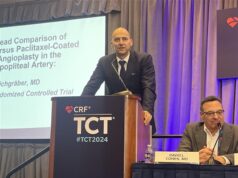
New 12-month clinical trial outcomes assessing the safety and performance of the Eluvia drug-eluting vascular stent system (Boston Scientific) reflect a primary patency rate of more than 96%.
Results from the MAJESTIC trial, which were presented at the Cardiovascular and Interventional Radiological Society of Europe (CIRSE) annual meeting (26–30 September, Lisbon, Portugal) also included a low 12-month target lesion revascularisation rate of 3.8%, with no observed stent fractures and no amputations.
“Achieving a 96% primary patency rate at one year, with low major adverse events, is exceptional,” said Stefan Muller-Hulsbeck, principal investigator and chairman, Vascular Center Diako Flensburg and head of the Department of Diagnostic and Interventional Radiology/Neuroradiology, Academic Hospitals Flensburg, Germany. “In my opinion, the sustained release of paclitaxel enabled by this technology could represent a significant advancement in the treatment of patients with peripheral arterial disease.”
On the back of these results, Müller-Hülsbeck announced the commencement of an international multicentre randomised controlled trial that will compare the Eluvia drug-eluting vascular stent system with Cook Medical’s Zilver PTX drug-eluting stent system. ZILVER PTX trial was the first randomised, controlled trial to show that drug-elution works in the periphery, and has data showing benefit for the Zilver PTX paclitaxel-eluting stent out to five years. Boston Scientific has received an Investigational Device Exemption (IDE) from the Food and Drug Administration (FDA) to begin a global, pivotal study of Eluvia. The study, named the IMPERIAL trial, is designed to support future regulatory submissions and patient enrolment is expected to begin in the coming months.
The principal investigators for the IMPERIAL trial that will be the first to compare two drug-eluting stent platforms, the Zilver PTX stent and Eluvia stent, in a head to head comparison, will be Müller-Hülsbeck and William Gray (New York, USA).
The MAJESTIC trial, a prospective, multicentre clinical trial, enrolled 57 patients across Europe, Australia and New Zealand, with an average lesion length of 70.8mm. The trial included a high percentage of complex lesions, with 46% of lesions classified as total occlusions and 65% identified as severely calcified.
Data from the MAJESTIC trial are expected to support global regulatory submissions.












